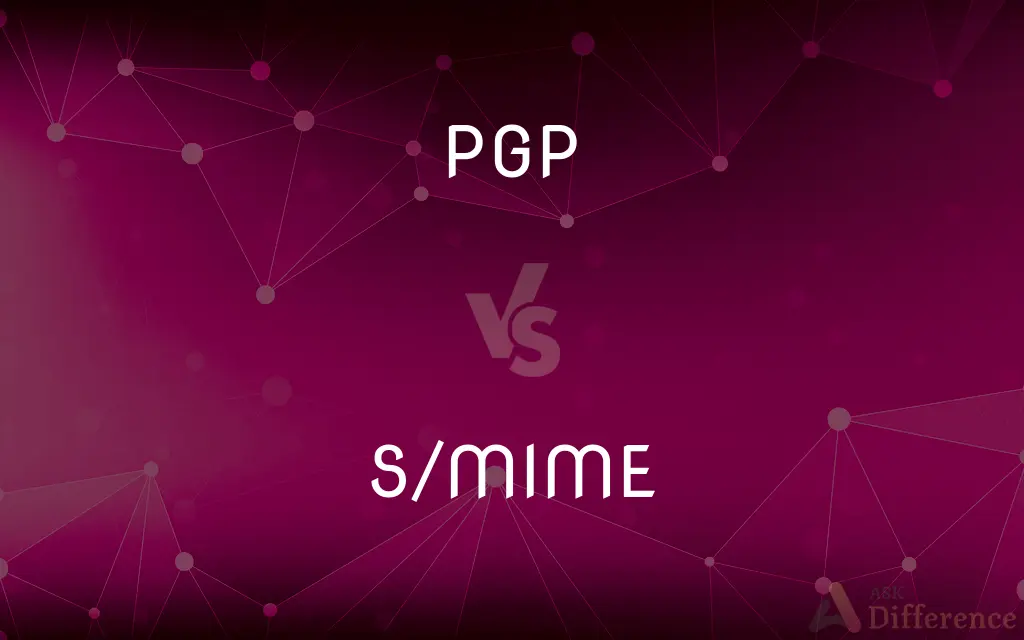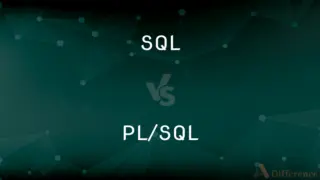PGP vs. S/MIME — What's the Difference?
By Tayyaba Rehman — Published on January 9, 2024
PGP (Pretty Good Privacy) and S/MIME (Secure/Multipurpose Internet Mail Extensions) are encryption protocols. PGP uses asymmetric encryption, while S/MIME relies on both symmetric and asymmetric encryption for secure email communication.

Difference Between PGP and S/MIME
Table of Contents
ADVERTISEMENT
Key Differences
PGP, also known as Pretty Good Privacy, employs asymmetric encryption, using public and private keys for secure email communication. S/MIME (Secure/Multipurpose Internet Mail Extensions), on the other hand, utilizes both symmetric and asymmetric encryption techniques within email protocols for data security.
In PGP, users generate a key pair (public and private keys) for encryption and decryption purposes, ensuring secure data exchange. S/MIME integrates encryption and digital signature capabilities into email services, employing both symmetric and asymmetric encryption algorithms for data protection.
PGP relies on web of trust, where users verify the authenticity of each other's public keys through a decentralized model. S/MIME uses digital certificates issued by trusted Certificate Authorities (CAs) to validate the authenticity and identity of email senders.
PGP provides end-to-end encryption through public-private key pairs, allowing only intended recipients to decrypt messages. S/MIME offers encryption and digital signatures within email clients, providing authentication and integrity checks for messages in transit.
Comparison Chart
Encryption Approach
Relies on asymmetric encryption (Public/Private keys)
Utilizes symmetric and asymmetric encryption techniques
ADVERTISEMENT
Key Management
Involves key pair generation for secure communication
Uses digital certificates issued by Certificate Authorities
Verification Mechanism
Web of Trust for verifying public key authenticity
Relies on trusted Certificate Authorities (CAs) for key validation
Deployment
Offers end-to-end encryption with key pairs
Provides encryption and digital signatures in email clients
Adoption
Utilized in various email encryption applications
Integrated into email clients and corporate email systems
Compare with Definitions
PGP
Utilizes asymmetric encryption for secure email.
PGP employs asymmetric encryption, using public and private keys to secure email communication.
S/MIME
Provides encryption and digital signatures in email clients.
S/MIME integrates encryption and digital signature features within email clients for secure communication.
PGP
Widely used in various email encryption applications.
PGP's robust encryption is employed in multiple email security applications for data protection.
S/MIME
Uses digital certificates for key validation.
S/MIME relies on digital certificates issued by trusted Certificate Authorities (CAs) for key authentication.
PGP
Involves generating a key pair for encryption.
Users create a key pair in PGP (public and private keys) for encrypting and decrypting messages.
S/MIME
Incorporates into corporate email systems.
S/MIME is integrated into corporate email setups, enhancing security through encryption and digital signatures.
PGP
Enables end-to-end encryption with key pairs.
PGP ensures end-to-end encryption, allowing only intended recipients with private keys to decrypt messages.
S/MIME
Ensures data integrity and authentication in transit.
S/MIME's encryption and digital signatures validate sender identity and maintain data integrity during transmission.
PGP
Relies on web of trust for key verification.
PGP's web of trust model verifies the authenticity of public keys through decentralized user validation.
S/MIME
Employs symmetric and asymmetric encryption.
S/MIME uses both symmetric and asymmetric encryption techniques for secure email communication.
Common Curiosities
Is S/MIME widely supported by email clients?
Yes, S/MIME is supported by various email clients and integrated into many corporate email systems for secure communication.
How does PGP encryption work?
PGP employs asymmetric encryption using public and private keys, allowing secure communication by encrypting data with the recipient's public key.
Are S/MIME digital certificates mandatory for secure communication?
While not mandatory, S/MIME digital certificates from trusted authorities enhance email security and key validation.
Can PGP encryption be used for file encryption other than emails?
Yes, PGP encryption is widely used for encrypting files and securing data beyond email communication.
How are public keys verified in PGP encryption?
In PGP, users verify the authenticity of public keys through a web of trust, where keys are validated by decentralized user participation.
What encryption methods does S/MIME use?
S/MIME utilizes both symmetric and asymmetric encryption algorithms to secure email communication and attachments.
Can S/MIME encryption be applied to mobile email applications?
Yes, S/MIME encryption is compatible with many mobile email applications, providing secure communication on mobile devices.
Is PGP compatible with different operating systems?
Yes, PGP encryption is compatible with various operating systems, enabling secure communication across different platforms.
How secure is PGP encryption against unauthorized access?
PGP encryption, with its robust asymmetric encryption approach, provides strong security against unauthorized access to encrypted data.
Can PGP encryption be applied to large file transfers?
Yes, PGP encryption can secure large file transfers, ensuring data confidentiality and integrity during transmission.
How does S/MIME provide email authentication?
S/MIME uses digital signatures that authenticate the sender's identity and ensure the integrity of email content.
What role do Certificate Authorities (CAs) play in S/MIME encryption?
Certificate Authorities issue digital certificates used in S/MIME encryption to validate the authenticity of public keys, ensuring secure communication.
Does S/MIME encryption ensure data integrity during transmission?
Yes, S/MIME's encryption and digital signatures maintain data integrity and authentication, ensuring secure transmission of information.
Is PGP encryption widely adopted by businesses for data security?
Yes, PGP encryption is extensively adopted by businesses seeking robust data security solutions, especially for sensitive information and communications.
Is PGP encryption suitable for personal use?
Yes, PGP encryption is widely used by individuals for personal data protection, securing emails, files, and sensitive information.
Share Your Discovery

Previous Comparison
Hybrid Orbitals vs. Molecular Orbitals
Next Comparison
SQL vs. PL/SQLAuthor Spotlight
Written by
Tayyaba RehmanTayyaba Rehman is a distinguished writer, currently serving as a primary contributor to askdifference.com. As a researcher in semantics and etymology, Tayyaba's passion for the complexity of languages and their distinctions has found a perfect home on the platform. Tayyaba delves into the intricacies of language, distinguishing between commonly confused words and phrases, thereby providing clarity for readers worldwide.














































